by Bill Murray
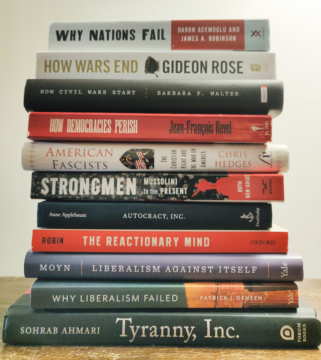 The same media that warned us against Donald Trump now warn us against tuning out. Though our side has lost, we must now ‘remain engaged’ with the minutiae of Mike Johnson’s majority and all that, strap in, batten down and pay attention.
The same media that warned us against Donald Trump now warn us against tuning out. Though our side has lost, we must now ‘remain engaged’ with the minutiae of Mike Johnson’s majority and all that, strap in, batten down and pay attention.
I was persuaded by media warnings against Donald Trump. Now that we must rise and shine and juice our kale, celery and Granny Smiths over Morning Joe at peril of losing our democracy, I am not so sure.
Last month The Atlantic declared “Decivilization May Already Be Under Way.” The Atlantic is perfect for an article like that. What do you bet the only difference between Jeffrey Goldberg and his readers is, somebody juices his apples and kale for him. Well, that, and that even his friends call him ‘Jeffrey.’
‘Decivilization’ is just overwrought. Except, when I raise my eyes to my bookshelves I find How Civil Wars Start, Why Nations Fail, How Democracies Die, Why Liberalism Failed, Liberalism Against Itself, Tyranny, Inc. and Autocracy, Inc.
Wait! Wait! Wait! What am I doing!?
It’s clearly time for a break. Not because I’m abandoning America. Not to flee MAGA (well, not entirely). It’s time for a little recentering and for the solace of a road trip. So where to go?
Since it’s the new year, lists of ‘hot’ destinations are everywhere. I’m not sure what ‘hot’ means, really. Places others are going? In that case, the same publication will have written elsewhere about overtourism ruining the same places.
All those lists are formulaic; there is no need to use them. Without fail they all contain a place or two you’ll never in a million years go (Queen Maud Land, Antarctica), a sprinkling of the old standards (Sydney or Provence or even central Italy – in spite of the 52 million overnight stays in Tuscany every year) and at least one non-sequitur like Oklahoma City, which shows your trendy list-makers are thinking “outside the box.”
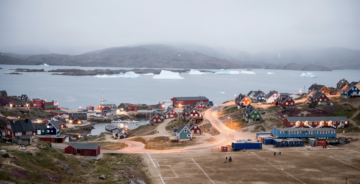
Greenland makes lists this year because until now from the US, access by air has meant a trip to Denmark (or Iceland, from where you can reach Tasiilaq, on Greenland’s east coast). Starting in June United Airlines will call at Nuuk, the Greenlandic capital, twice a week from Newark.
In preparation, the Nuummiut (“people of Nuuk,”) have taken steps to preserve local ownership of the tourism business, and anyway for now, Nuuk only has about 550 hotel rooms. But this sounds like a case of the good people of Nuuk needing to be careful what they wish for.
With impeccable timing Condé Nast Traveler lists Cuba as one of their top 25 places to go in 2025. Its timing recalls Vogue’s “A Rose in the Desert” profile of a “stylish, modernizing” Asma al-Assad in 2011, weeks before her husband’s rule led to, well, you know what it led to.
Cuba, I’ll wager is about to be slammed shut for Americans, for the second time, by the second Trump Administration. The incoming Cuban-American Secretary of State is surely somewhere dank and dim right this minute, scheming to make Cuba a four letter word again.
Anyway, everything about ‘hot locations’ is just marketing; the same places rotate through the same lists every few years. They come and go like skinny, then wide-legged, then skinny jeans.
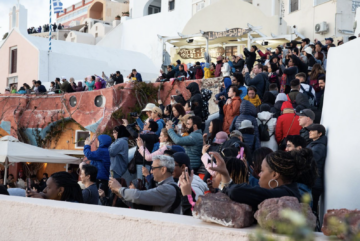
Everybody knows by now that overtourism is real. Last summer a travel site called earthtrekkers.com unironically published “Sunset in Oia, Santorini: 2 Amazing Photography Locations” suggesting where you might take the perfect picture. This photo accompanied the article.
All this shoulder to shoulder sunset watching tells me a few things: that the fear of missing out is alive and well. That not needing an online stamp of approval for your destination is helpful, maybe even liberating. And that, in the era of Tik Tok, Instagram and the selfie, there are travel benefits to being, let’s gently say post-youth, and having already seen the really busy places.
If you don’t feel the need to choose between Provence or Tuscany, la tour Eiffel or the Trevi Fountain, the road opens much wider. Maybe it even gives you your own lane.
Suddenly, where to go all boils down to you, including your idiosyncracies and insecurities, your odd and obscure notions. For me, the audacity of crossing the River Congo, Brazzaville to Kinshasa, aboard a battered old ferry, as if I had any business there at all, stands as pretty much the height of travel attainment. That’s what I mean about idiosyncracies.
That trip is for the future. This year I’d like to revisit Taipei before events render future visits untenable, as geopolitics has done to travel to Ukraine. Who knows when Beijing may challenge Taipei’s independence?
The consensus is probably not until at least 2027 because Xi Jinping has ordered his People’s Liberation Army to be ready by then, but who really knows? Rule of thumb: go now, not later. I’ll think of my visit as a modest personal statement against encroaching restrictions on freedom of movement.
Let’s discuss two factors to consider when choosing where to go: crime and boredom. People think far too much about the one and never consider the other.
The fear of crime holds so many people back so unnecessarily. What might happen that’s not statistically more likely in the United States? There are pickpocketing and low grade tourist scams everywhere, but you’ll be far more likely to be pilfered in that Santorini sunset crowd, or the Trevi Fountain scrum, than, say, on a drive through Burundi. Places like rural Africa, just seeing the mzungu is spectacle enough. No need for your money.
This doesn’t hold everywhere. In Madagascar Zoma means Friday, and it’s also the name for the positively teeming Friday market in the capital, Antananarivo.
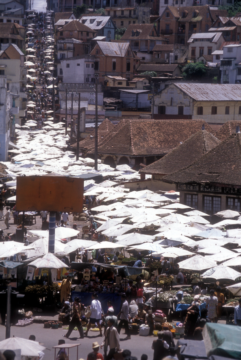
Antananarivo, Madagascar
At the time of our visit the internet hadn’t quite supplanted guide books and I think The Bradt Guide to Madagascar was the only guide book to Madagascar. It’s strange to prepare for theft, but Ms. Bradt was adamant.
Fix your bag to minimize what they get if they slash it open, she said. “The Zoma is notorious for thieves. It is safest to bring only a small amount of money in a money belt or neck pouch. Enticingly bulging pockets will be slashed.” Not much doubt about “will be.”
From the Zoma‘s entrance a sea of white umbrellas washed out ahead in every direction, swallowing up the main Independence Square, flowing into busy little eddies beside stairways, up the hills as far as the eyes could see. Up one hill, down the next.
All the way down and halfway back, we didn’t spy anyone from our part of the world, for maybe an hour. The Zoma was for local folks, chock full of feed bags, locks and hinges, plastic jugs and auto parts. Not much for the visitor to buy to remember it by, but the memory is indelible. Plus, we made it all the way through unrobbed, and the sense of that accomplishment took us through the whole day.
Then there’s boredom. The traveler Chris Arendt (You should take a look at his Walking the World substack), says boredom is the whole problem with West Africa; there’s nothing to do. With very limited experience in the region, only in Côte d’Ivoire and Senegal, I think he may be onto something. For cultural stimulation, for example, we once visited a laundry outside Abidjan (Story here).
The well-rounded traveler is proud of his ability to live in the moment and his efforts to see the good side of anything. That’s a trait that’s probably key to enjoying an unfamiliar place where nothing happens.
It seems unlikely that you’d be bored in an entirely unfamiliar environment. But before you scoff, have you ever visited Paraguay? Asunción is surely the farthest back water washes to a national capital. It’s as if its residents didn’t ask for the honor, but Paraguay had to have a capital somewhere, so Asunción amiably accommodated.
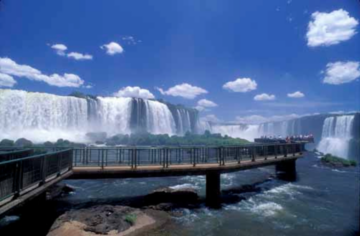
If you don’t fly in, it’s not effortless to get to Asunción. But since a remarkable, world class spectacle sits at the corner of Brazil, Argentina and Paraguay, a waterfall called Iguazu, we combined the two destinations.
From the falls it’s an hours-long, drippy humid, lonely drive across aimless gaucho badlands to Asunción. Here’s how lonely: somewhere a gravel track wandered off, southbound to the horizon. A sign with an arrow on the corner read “Novotel 247K.”
In return for the drive you’re rewarded by a not very big city center that’s not very busy. Because of the heat you will want to get an early start to your sightseeing day. You’ll only need one. You will see the main Plaza de los Heroes, and a building modeled after the Pantheon.
Mercaderas offer languid market fare at tables along Avenue Palma, selling the usual allegedly name brand watches and Nike clothes and plastic toys for kids. Birds are loud, it’s hot hot hot and viejitos del parque play dominoes or steal a nap, already, by 8:45.
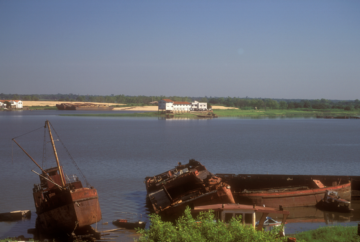
Down at the riverfront (grandly called Asunción Bay) beyond the presidential palace, children pumped water at a clutter of squatter shacks. A sand spit stretched out to two rusting shipwrecks, resting over on their sides, just on the edge of shore.
In retrospect, heat contributed to the boredom. Nobody wants to do much when it’s 106 degrees with 106 percent humidity. And the Asuncenos were perfectly gracious, all.
Now, boring travel isn’t worthless travel. You learn things nobody would tell you otherwise. Like, that Paraguayans don’t honk their horns like they do in many other poor countries. There’s something you didn’t know.
In my experience so far, Asunción is the world’s least interesting capital city. Others may be less vital. I haven’t visited Juba yet, or Maseru. Podgorica may be more interesting, but it’s playing in the same league. Asunción is dull but it’s safe, and one thing Asunción is not, it’s not mean.
There’s a relatively new trend in glossy travel magazines, the idea of slow travel. I imagine it’s a reaction to frantic package tours in the same way the slow food movement objects to McDonald’s and the Colonel.
Nothing new here, really, since all travel was once slow travel. I just read that when Karl Marx studied in Berlin in the 1830s, his trip back home to France took five days.
Marketers have got hold of slow travel and made it ‘up and coming.’ Condé Nast, arbiter of trendy for well to do Americans, calls slow travel “more mindful, more environmentally responsible, less purely convenient.” Fine. If only anybody had the time.
Which is why slow travel is probably more aspiration than trend, destined to come and go like those skinny then wide then skinny jeans. And there’s something else. Surely in the pew adjacent to slow travel lurks pernicious, deadly boredom.
I’m imagining a slow trip across Ireland. In the rain on the afternoon of day six, I’m watching Ms. O’Hanrahan’s kids stomping and screaming, slick and sliding in the mud in the bog alongside my rental caravan, when the booking agent texts to exclaim on the authenticity of my Irish experience.
The slow travel argument is that sharing with the O’Hanrahan clan next door is ‘experiential’ and preferable to staying home and stocking your man cave. I vote for Ireland over the one hundred fourteen inch TV, just maybe not multiple days in the bog.
But then, complaining, whether about overcrowded tourist destinations, too fast or too slow travel or one of my favorites, the very idea of the cruise ship, has been sport for haughty travelers like me forever.
The Stoic Seneca advised his friend Lucilius to avoid the luxurious resort town of Baiae no Naples Bay, calling it a “resort of vice” where people went to overindulge and show off.
An English traveler named Thomas Coryat wrote in 1611 about Venice being overwhelmed with tourists, particularly English travelers like him. He felt his countrymen were ruining the authentic experience of the city.
On our only trip to Amman a few years ago, we dined with a stranger who struck us as distinguished. Disdainful and disapproving of the culturally insensitive dress of a group dining nearby, we lamented over our lamb and yogurt that if this kind of thing kept up, future visitors to Jordan wouldn’t have the unique experience we were having. We thought ourselves wisened travelers.
In truth of course, visitors to Amman this year will have just as culturally enriching an experience as we did. Opinions are individual. If I suggest you ought not rank Asunción on your personal top 25 destinations for 2025, that’s just me. For that matter, maybe you need to head down there and see what you think.
Wherever it might be, go somewhere this year. Get outta town. But choose your destination well. Spend a week or two to consider your goals before you decide. Roll it around in your head, think about it. Because an incautious mix of discretionary income + consumerism + media + ill defined goals + not thinking things through + ‘influencers’ could lead to misadventure. And that brings us back where we started. It’s how we’ve reelected Donald Trump.
•
I write more articles like this at Common Sense and Whiskey.
Enjoying the content on 3QD? Help keep us going by donating now.
